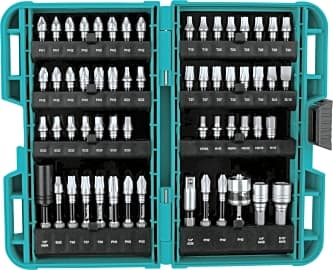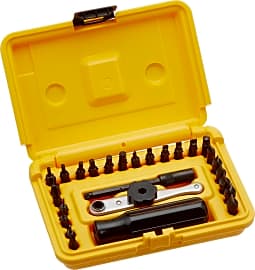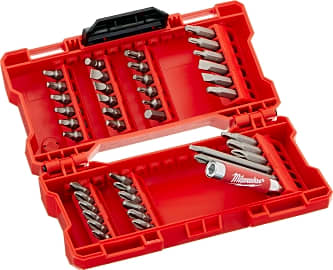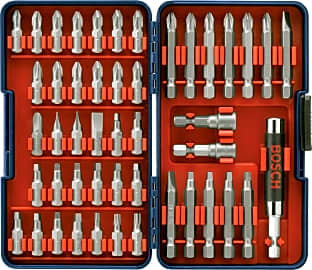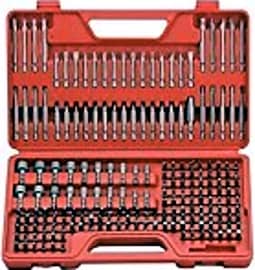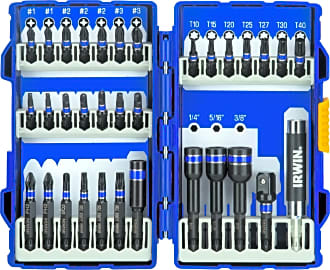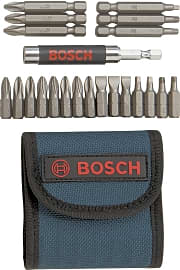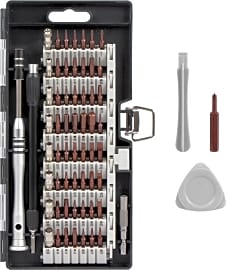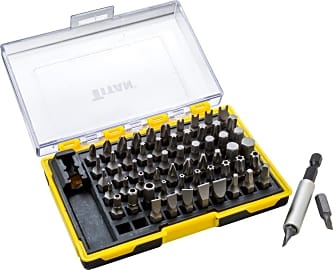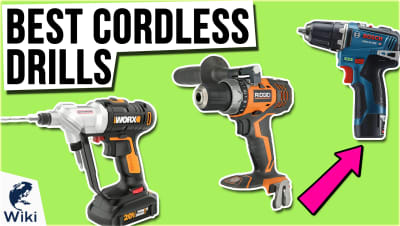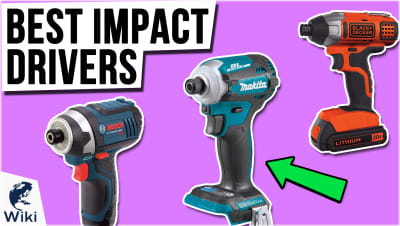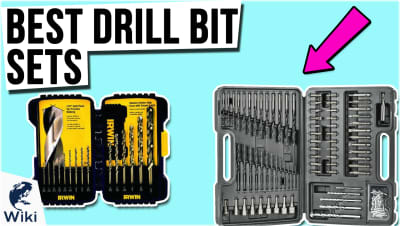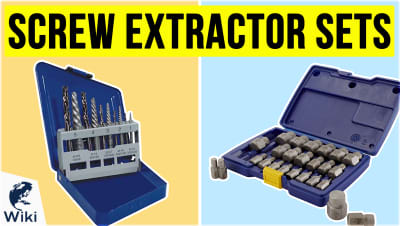The 10 Best Screw Bit Sets

This wiki has been updated 40 times since it was first published in October of 2015. Whether you are a professional contractor or an occasional home DIYer, you'll never be without the right tool for the job if you have one of these handy screwdriver bit sets. Our selection includes compact kits filled with the most common sizes to more comprehensive options suitable for industrial and automotive applications. Here we rank them for quality, durability, and price. When users buy our independently chosen editorial recommendations, we may earn commissions to help fund the Wiki.
Editor's Notes
August 26, 2020:
Removed the Tacklife HBWS1A in favor of the Makita E-01644 in order to reflect more impact-compatible options.
It's important to use the appropriate bit-type with the driver you are using. The main distinction is between impact and non-impact. The difference between the two is in the materials and design. Non-impact bits like in the DeWalt DW2166 and the Milwaukee 48-32-1551 are typically made with vanadium steel, which is a fine material to use with normal drivers. But impact drivers use hammer mechanisms that turn bits by striking a hammer on an anvil. This means that if you use an impact driver on chrome vanadium bits, they have a high likelihood of shattering. Impact bits, on the other hand, are typically made with more pliable molybdenum steel and sets like the Makita E-01644 are also designed with torsion zones that make for bits that can consistently withstand the powerful striking of an impact driver. It is not the case that between vanadium and molybdenum steel, one is better than the other. They have different properties that make them best suited for different purposes so choose accordingly.
July 04, 2019:
Coming on board is the Craftsman Ultimate, which has a lot to offer, with 208 alloy steel bits in both standard and specialty sizes and designs, including Torx, Phillips, and hex options. The slotted storage case proves useful for keeping everything organized, and it includes clear labeling. With all that it has to offer, this comprehensive set proves an excellent value for the price.
The DeWalt DW2166 and Chapman MFG #8900 Slotted retain their top spots, as these time-tested solutions are known for their durability and high-quality designs. The DeWalt features some double-sided bits, which means fewer pieces for you to keep track of. In addition, it comes with two extra-long bits, to help you handle fasteners located in hard-to-reach areas. The Chapman, used by all branches of the U.S. military, is made in the United States and heat-treated, for a tough finished product that will hold up under extensive use. These bits’ sturdy, hollow ground (rather than tapered) build helps provide contact with all areas of the slotted screw, for efficiency and less chance of damage. These bits are actually designed to break before the screw does.
Leaving the list is the as-seen-on-TV Prime Line Bit 360, a small, handy kit to have around the house or in your glove compartment, but from which the bits seem to become disconnected frequently during use.
No matter which you choose, for safety’s sake, always follow the instructions carefully that are provided in the owner’s manual. When working with power tools, always follow proper procedures such as protecting your eyes with safety goggles and staying away from live, electrical circuits.
Special Honors
McMaster-Carr Screw Bit Assortment Sold in several different combinations, each set comes with at least nine bits and one adapter. Available bits include Phillips, torx, hex, slotted, square, Pozidriv, drilled spanner, Tri-Wing, clutch, and tamper-resistant hex. Some selections also feature one or more drive tools. They’re from a century-old company that sells a variety of mechanical, electrical, and plumbing hardware. mcmaster.com
Choosing an All-Important Screw Bit Set
A good set of screw bits helps to alleviate the difficulty and annoyance of inserting hardware by readying you to work with varied types and sizes of screws.
Almost every single person, regardless of his or her career, hobbies, location, or age, will at some point have to put screws into something. This can take the shape of the student assembling furniture in her college apartment or a dad hanging a shelf in his son's bedroom; it can mean the professional carpenter erecting the framing of an entire house or the doctor putting a single new degree on the wall behind her desk. While in the course of a given year most people may not repair a faulty outlet, fix a leaking faucet, or re-tile a bathroom floor, if there is one physical task we all complete at least from time to time, it is surely sinking screws into holes.
But even this ostensibly simple task, this insertion of a screw into a wall, furniture section, or other surface, can be surprisingly complicated if you don't have the right tools for the job. Try using a flathead screwdriver in a screw with a Phillips head, for example, or a bit that's too large or small to properly fit the screw in question, and you'll quickly realize just how frustrating -- and at times impossible -- it can be to sink a screw without the right tool.
A good set of screw bits helps to alleviate the difficulty and annoyance of inserting hardware by readying you to work with varied types and sizes of screws. At its most basic, a screw bit set should simply contain a few different sizes of both flathead and Phillips bits, ideally with tips small enough to access the tiny screws of a handheld electronic devices battery compartment and with larger bits suitable for use with a standard drywall screw (see below for more information on various types of hardware). Look for a set that comes with a decent screwdriver handle into which the bits can be set; many bits can also be used in a drill, but by choosing a set that does not necessitate owning additional tools, you avoid potentially having a set of bits you can't even use.
A simple set like that will likely be the only one most people need; however, there are many screw bit sets that are much more comprehensive yet still surprisingly affordable, and are well worth the consideration of anyone who thinks he or she might at some point need a specialized bit. Examples of bits that many people may not at first think are important to own include square-shaped bits, hex bits, and more. Buying one larger, well-stocked set of bits once may well save you from spending more money later as you augment the smaller, simpler set you initially thought would suit all of your needs.
Finally, once you have identified the types of bits you will need in your set, take time to consider how they are made considered against how you will them. Some bits are made from steel and are suitable for regular light duty use, while others are coated in titanium and can stand to regular heavy-duty work.
The Additional Tool and Hardware You'll Want
A screw bit set that comes with a good screwdriver handle can do much to help you hang pictures, assemble shelving, or make basic repairs around the home, garage, or office. However, if you're going to be sinking lots of screws, the comfort of your wrist and the efficient use of your free time both merit the purchase of a good drill. (Also called "drivers" by some, but for our purposes, we will use the more common term.)
The right bit can help make perfect holes in everything from tile to drywall to wood to steel, clearing the way for a screw to sink into the material securely but with ease.
Most standard drills have an easily-adjusted chuck, which is the slot where a bit is inserted and then secured as the jaws tighten onto the shank of a screw or drill bit. Make sure you select a drill with a chuck than can be tightened enough to grab onto the bits you own (or are going to purchase), but know that most standard drills will be able to do this just fine. Also make sure you obtain and learn how to use a drill with adjustable torque settings, as changing the torque helps you to safely and effectively bore into or drive screws into various types of material while minimizing the chance of damaging the hardware or material.
Along with your new screw bits and drill, you will also want to obtain a good set of drill bits. The right bit can help make perfect holes in everything from tile to drywall to wood to steel, clearing the way for a screw to sink into the material securely but with ease. Pre-drilling holes helps reduce the chance for damaged materials and will save you time and effort. With a good drill, the right drill bits, and a set of screw bits, you will be ready to build, hang, or repair a plethora of thing.
A Few Words on Types of Screws
The best drill, screw bit set, and drill bits won't do you any good at all if you don't have screws to twist into place. And using the wrong type of screw for a given type of material is only marginally better than using nothing at all. Instead of watching as an improperly-hung shelf falls away from the drywall or as a board of fine quarter-sawn oak splits as you sink in a screw that was designed for use in concrete, take a few minutes to educate yourself about using the right hardware for the job.
Wood screws have a sharp point and broad threading that helps to pull them down into the relatively soft medium of wood.
Wood screws have a sharp point and broad threading that helps to pull them down into the relatively soft medium of wood. Most are not threaded all the way to their heads. They are among the most common type of hardware.
Machine screws have a flat bottom and tightly-stacked, narrow threads. They are designed for use in pre-drilled holes and are almost always used in metal.
Sheet metal screws are designed to cut through thin layers of metal without a pre-drilled hole required. They are thread all the way to the head to ensure they pull themselves all the way into a their media.
Drywall screws have sharp points and gradually tapered bodies with widely-spaced threading. This shape and design helps the screw sink itself into a molly pre-inserted into a hole drilled into the drywall.
And for a bit of historical perspective, while the concept of the screw was well-known even in 400 or 500 years before the start of the Common Era (as evidenced by various writings of Ancient Greeks), metal screws were not used as fasteners until the Renaissance, first regularly seen in the 1400s. The now-ubiquitous Phillips-head screw was not used until the 1930s; the eponymous hardware was invented by an American named Henry Phillips.


